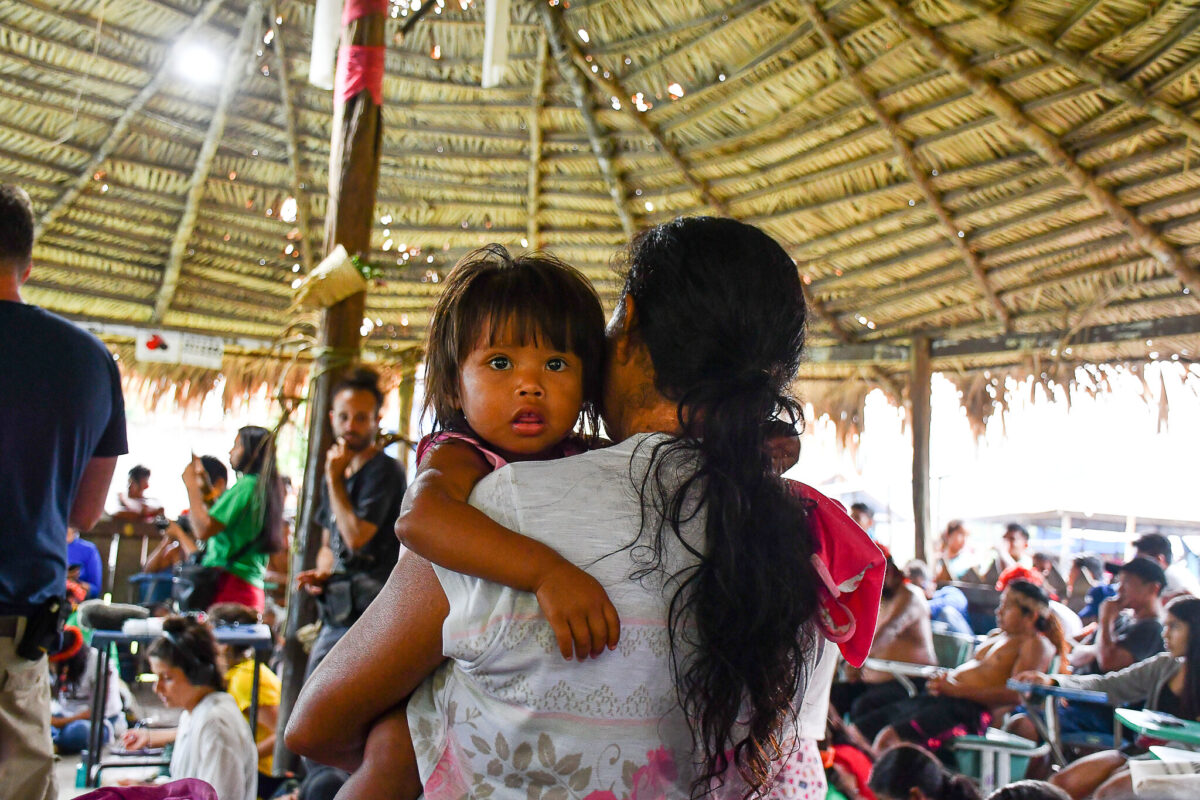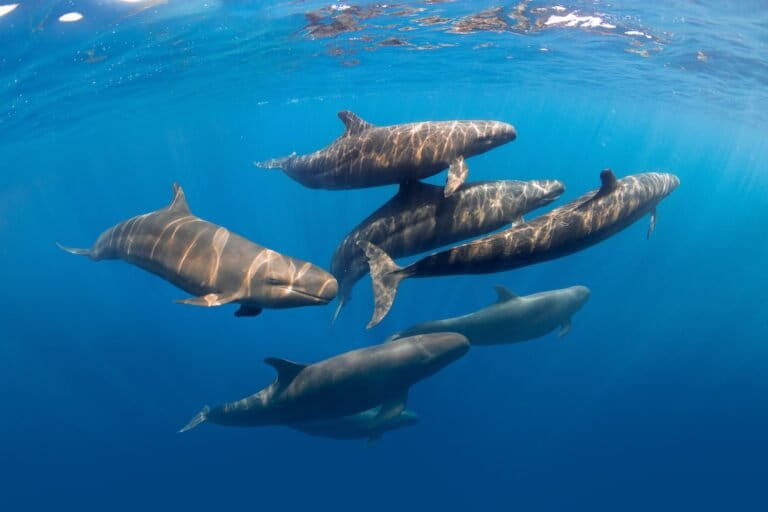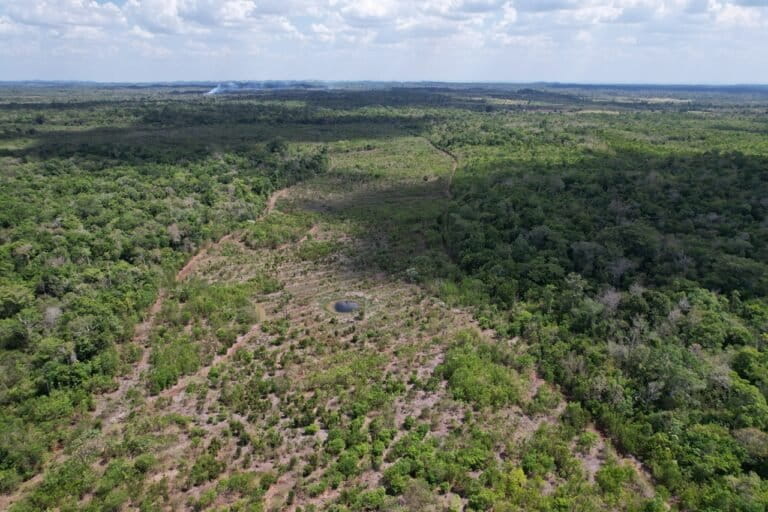- Júnior Hekurari Yanomami is a leader of the Yanomami people in Roraima state, Brazil, where he founded an organization to aid his people after working as a health worker.
- In a Mongabay interview, the Indigenous leader called for a boycott of Brazilian gold and said he hoped for efforts to find long-term solutions to keep illegal miners out of the Yanomami territory.
- In early March, Júnior led a campaign to raise international awareness about Amazonian gold by awarding wooden statuettes to Oscar nominees.
When asked if he had a message for the world, Júnior Hekurari Yanomami was emphatic: “Don’t buy Brazilian gold.” Júnior, 36, from the Surucucu community on Brazil’s largest and most famous Indigenous territory, the Yanomami, met Mongabay in a hotel near São Paulo’s Paulista Avenue.
Home to some 27,000 Indigenous people, the Yanomami land is currently in the midst of a grave humanitarian crisis driven by illegal gold mining, enabled and encouraged during the previous government of far-right former President Jair Bolsonaro.
Luiz Inácio Lula da Silva, who took office as president in early January for a third term (the first two spanned from 2003 to 2010), has made removing illegal miners and the influence of their moneyed bosses from the Yanomami land a top priority.
Restoring order in the Yanomami Territory serves as a litmus test for Lula’s bold climate agenda. Since February, federal forces have led successive crackdown operations, destroying valuable mining equipment and making arrests.

While many illegal miners have left — often for neighboring countries Venezuela, Suriname and Guyana, or other Brazilian states like Pará — Junior said that many are merely biding their time before invading the Yanomami Territory again.
Mongabay interviewed Junior the same week that an Associated Press investigation revealed the use of Elon Musk’s Starlink satellites in the territory, which have proved a boon for illegal miners.
The high-powered portable internet enables mining mafias to keep in contact, warn of police raids and send cash remotely, reflecting the increasingly high-tech nature of Brazil’s current illegal mining boom.
The Yanomami Territory is the size of Portugal and is only accessible, in practical terms, by air. Junior blamed highly capitalized business figures in Roraima state for being the ringleaders of the illegal mining scam.
While making it very clear that he didn’t feel any pity for the often poor and uneducated illegal miners “used” by businessmen, noting that “Indigenous lands are not job centers”, he conceded that in the long term sustainable employment solutions would help.
The young leader and health worker recently championed a campaign at the Oscars, “The Cost of Gold,” to raise awareness of the often-murky origins of the metal, as well as the current plight of the Yanomami.
Different from the traditional gold-plated statuette, 20 Oscar nominees received a wooden figure of Omama, a Yanomami deity.
This interview has been edited for length and clarity.
Mongabay: What was the thinking behind the idea for the Oscars campaign “The Cost of Gold”?
Júnior Hekurari Yanomami: It was actually a suggestion by some people on my team. I thought it was a great idea. Raising awareness among the world’s best-known actors. The Oscar has gold. We know that tons of gold leaves the Amazon illegally for other countries and we want to show the world that this gold has the blood of families that suffered. Therefore, we approach great artists and great actors so we can have this dialogue and tell them: “You don’t need gold.” For us, to remove this gold, we suffer a lot. Lives lost, mothers suffered.
Mongabay: How do you rate the Lula government’s efforts to rid the Yanomami land of illegal miners so far?
Júnior Hekurari Yanomami: It carries a very strong symbolism. We are optimistic. The Lula government decreed to accompany and protect the Yanomami land. Now the Federal Police, IBAMA [the government’s environmental agency], carried out major operations where they removed many illegal miners from the Yanomami Indigenous land. Now it is up to us to reorganize the communities. For us to guarantee freedom, cultural events in the communities and to guarantee the future of the children.
Mongabay: The last election was very tight. Do you worry that a change of government in 2026 — or perhaps increased political instability — could accelerate the destruction once again?
Júnior Hekurari Yanomami: We are afraid because we already asked for this territorial protection [under Bolsonaro]. Politics changes a lot. Who will be president in 2026? It could be that people want a different one. The election can change everything, and then we are unprotected again. Bolsonaro left us unprotected. We are worried that it could happen again: encouraging miners to come in, cuts to the inspection agencies, cuts to resources for Indigenous health.

Mongabay: What can the Yanomami do to heal the land?
Júnior Hekurari Yanomami: The destruction is enormous; it will take 20 or 30 years to heal. We need public policies, the government has to make a project to remove the mercury from the rivers. Even the source of the rivers has been destroyed.
Mongabay: What is different about today’s invasion compared with the invasion in the 1980s?
Júnior Hekurari Yanomami: The machines and technology they use today are so much more powerful. The fish were recovering well [from the last invasion], but today after the new invasion there are no more.
Mongabay: What do you think about the fact that authorities seized Elon Musk’s Starlink satellites in possession of illegal miners on the Yanomami land?
Júnior Hekurari Yanomami: The government itself doesn’t have this technology but the miners do. We ask ourselves, how can that be?

Mongabay: Are the illegal miners really leaving or just plowing deeper into the territory?
Júnior Hekurari Yanomami: We have information that they are leaving, but they will invade again. They know that these operations will not be permanent. So we are demanding a permanent post of Funai [the country’s Indigenous affairs agency] and IBAMA in the communities. Others have gone to Venezuela — you can even see helicopters bringing miners from there — while others have gone to other states like Pará to invade Indigenous lands there.
Mongabay: Who finances illegal mining on the Yanomami land?
Júnior Hekurari Yanomami: There are 80-120 flights a day to the Yanomami land, taking people to look for gold, to leave food, fuel and supplies for the miners, for them to destroy the forest even more. It’s not some poor person that is running this scam. Businessmen promise them [illegal miners] money, that they’re going to get rich. But it’s the businessmen with the helicopters and planes who are getting rich.
Mongabay: Gold prices are high because of global instability driven by the war in Ukraine, meaning mining mafias will try their luck on Indigenous lands. What needs to be done in the medium to long term to prevent another tragedy?
Júnior Hekurari Yanomami: Indigenous lands are not job centers. The government has to create other alternatives for employment for these people who are invading.
Mongabay: Do you have a message for the world, for audiences reading this story?
Júnior Hekurari Yanomami: Support the Yanomami people and don’t buy gold from Brazil.
Banner image: The Omama statuette, different from the traditional gold-plated Oscar, was sculpted on wood. “The Oscar has gold. We know that tons of gold leaves the Amazon illegally for other countries and we want to show the world that this gold has the blood of families that suffered,” Júnior said. Image courtesy of Gil Inoue / DM9.
FEEDBACK: Use this form to send a message to the author of this post. If you want to post a public comment, you can do that at the bottom of the page.
Yanomami crisis sparks action against illegal gold in the Amazon













